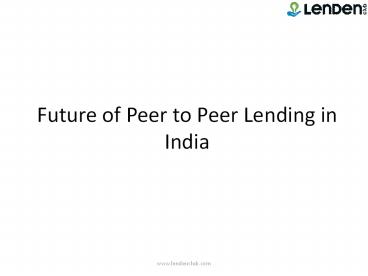Future of Peer to Peer Lending in India - PowerPoint PPT Presentation
Title:
Future of Peer to Peer Lending in India
Description:
With RBI’s support, the P2P industry is ready to move to the next level of market adoption for lending money online. With all things going their side, P2P lending platforms are here to stay. – PowerPoint PPT presentation
Number of Views:34
Title: Future of Peer to Peer Lending in India
1
Future of Peer to Peer Lending in India
2
India is the second fastest growing economic hub
in the world. Millennials today, as young as 21
years are focusing on living their lives to the
fullest even if their means are limited. In order
to meet these needs, people are looking out for
money being available at their disposal almost
instantly for which they are resorting to newer
avenues of finance like Peer to Peer Lending in
India. In the recent years, Peer to Peer (P2P)
lending platforms also known as Non-Banking
Financial Companies (NBFC-P2P as per RBI
directive 2017) are setting a new trend. With the
advancements in digital technology, P2P
lending is made hassle free and less tedious. The
main advantage of P2P borrowing is that the loan
processing is done through a complete online
technology-based process.
3
- RBIs Motive of Credit Inclusion
- Even Though the industry is at a nascent stage,
P2P in India has started gaining momentum.
However, the 2017 RBIs guidelines have addressed
some of the key concerns of the industry and
cleared many unregulated practices. - RBI Regulations
- P2P Platform will only serve as mediators for
matching and originating loan deals between
lenders and borrowers. - Lenders can lend a maximum of INR 10,00,000
across P2P lending platforms - All P2P must give top priority in ensuring
confidentiality of customer data and offer
complete transparency in its operations. - Need to submit regular financial reports, loan
arrangement deals, a summary of complaints filed
by borrowers or lenders with RBI.
4
- Future scope of P2P
- Above mentioned RBI regulations are expected to
impact the P2P lending space as follows - The P2P market is estimated to grow to around
4-5 billion by 2020 - A major chunk of the currently underserved market
will be covered under the financial umbrella, all
thanks to P2P platforms - People that are currently opting for banks to
fulfil their financial needs, would migrate to
P2P lending platforms as the P2P loan application
processes are very efficient. This very trend has
been spotted in countries like UK and the US
where P2P lending platforms have become more
preferable over banks - For the lenders on these P2P platforms, the
returns are very lucrative which will continue to
be the case along with more checks and processes
introduced by P2P platforms in order to keep NPAs
in check.
5
Conclusion With RBIs support, the P2P industry
is ready to move to the next level of market
adoption for lending money online. With all
things going their side, P2P lending
platforms are here to stay.
6
Thank You































